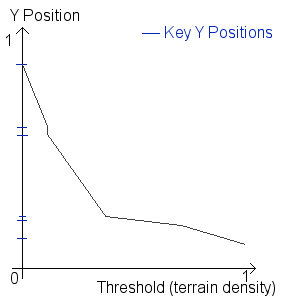Modding:WorldGen Configuration
This page was last verified for Vintage Story version 1.19.
Landforms
Landforms define the shape of the terrain. Let's take a look at an existing landform.
{
"code": "landforms",
"variants":
[
{
"code": "humongous mountain",
"comment": "humongous mountains with caverns in them",
"hexcolor": "#5BC184",
"weight": 2,
"useClimateMap": false,
"terrainOctaves": [0, 0, 0, 0, 1, 1, 1, 1, 0.6, 0.2],
"terrainOctaveThresholds": [0, 0, 0, 0, 0.5, 0, 0, 0, 0, 0],
"terrainYKeyPositions": [0, 0.33, 0.37, 0.42, 0.43, 0.5, 0.6, 0.7, 0.9, 0.97, 1],
"terrainYKeyThresholds": [1, 1, 0.87, 0.84, 0.7, 0.94, 1, 1, 0.1, 0.05, 0]
},
]
}
There are 2 system at work that let you control the shape of the terrain - the octaves and the Y-Thresholds.
Octaves
If you know perlin noise, you will know what this is, but shortly explained low octaves will give you very smooth terrain whereas high octave give you rugged/chaotic terrain. You can mix an match freely between those. Examples:
terrainOctaves: [1, 0, 0, 0, 0, 0, 0, 0, 0, 0]would give you veeeery gradually changing terrainterrainOctaves: [0, 0, 0, 0, 0, 0, 0, 0, 1, 1]would give you veeeery rugged and chaotic terrain
Octave Thresholds
These act as substractor to the octaves. This allows you for example to generate a flat terrain with a few rare bumps, by setting something like this:
terrainOctaves: [1, 1, 1, 0, 0, 0, 1, 0, 0, 0],
terrainOctaveThresholds: [0, 0, 0, 0, 0, 0, 0.7, 0, 0, 0],
This causes the 7th octave to be only active 30% of the time, as most of it is substracted away.
Note: The amount of octaves is always fixed at 10. You can't configure less or more than 10.
Y-Thresholds
Imagine you had a side view of a mountain and you could make it wider and thinner at any given elevation. This is approximately how the y-threshold system works. terrainYKeyPositions are the relative (0=bottom, 1=top of the world) coordinates and terrainYKeyThresholds define how much Percent of terrain should be solid blocks (0 = always solid, 1 = always air), or in other words it's density. We could also make a graph of this:
In this example at maximum world height the density is 0, so there will always be air blocks. In the middle we have a jump where the y-position changes, but not the density, so this will create cliffs in the mountain. On the lower end the opposite happens. The Y-Position changes very little but it's density increases a lot. If that position happens to be at the sealevel we would get flat beaches. The default sealevel y-position is 0.43 And below a certain y-position the density is always 1. If we would set that to a lower value, we would get very deep lakes.
The amount of configurable Y-Thresholds is arbitrary you may use any quantity, just make sure both lists have the same amount of elements. However, it wouldn't make sense to configure more than 256 thresholds for a world height of 256 blocks.
You can build such graph using the new world gen tool
Testing Landforms
You can trial&error landforms very quickly without the need to restart the game every time you made changes to the landforms.json
/wgen autogen 0- disables automatic generation of chunks/wgen del 10- delete all chunks with a radius 10 chunks (Warning: Cannot be undone!)/wgen regen 5- Reloads the landforms.json then deletes and regenerates all chunks with a radius of 5 chunks
| Content Modding | |||||||||
|---|---|---|---|---|---|---|---|---|---|
| Basics | Content Mods • Developing a Content Mod • Packaging & Release | ||||||||
| Tutorials |
|
||||||||
| Concepts | Modding Concepts • Modinfo • Variants • Domains • Patching • Remapping • World Properties | ||||||||
| Moddable Assets |
|
||||||||
| Uncategorized |
|
||||||||
Wondering where some links have gone?
The modding navbox is going through some changes! Check out Navigation Box Updates for more info and help finding specific pages.
| Modding | |
|---|---|
| Modding Introduction | Getting Started • Theme Pack |
| Content Modding | Content Mods • Developing a Content Mod • Basic Tutorials • Intermediate Tutorials • Advanced Tutorials • Content Mod Concepts |
| Code Modding | Code Mods • Setting up your Development Environment |
| Property Overview | Item • Entity • Entity Behaviors • Block • Block Behaviors • Block Classes • Block Entities • Block Entity Behaviors • Collectible Behaviors • World properties |
| Workflows & Infrastructure | Modding Efficiency Tips • Mod-engine compatibility • Mod Extensibility • VS Engine |
| Additional Resources | Community Resources • Modding API Updates • Programming Languages • List of server commands • List of client commands • Client startup parameters • Server startup parameters Example Mods • API Docs • GitHub Repository |
